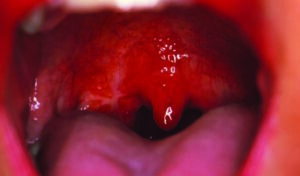When a resident gets a call in the middle of the night about a pediatric patient still in pain after a tonsillectomy despite taking nonsteroidal anti-inflammatory drugs (NSAIDS) or other nonopioid medications, their first inclination might be to prescribe an opioid. But experts in a session at the American Academy of Otolaryngology–Head and Neck Surgery’s (AAO-HNS) 2021 Annual Meeting said that this can be a risky way to respond.
Explore This Issue
November 2021“How do you work with your residents to not just have a knee-jerk reaction?” asked Heather M. Weinreich, MD, MPH, assistant professor of otolaryngology–head and neck surgery at the University of Illinois at Chicago.
David H. Chi, MD, chief of pediatric otolaryngology at the University of Pittsburgh School of Medicine, said he recommends a fuller discussion with the parents. “One of the first things that we’ve done with our resident team is to really emphasize the importance of counseling,” he said, “because many times parents will call in frustrated about not having pain control. The physician and the family can talk about going to the emergency room or about taking an opioid—with appropriate education about the risks.” Dr. Chi said.
Risks of Opioids
Prescribing opioids in children brings serious risk. Studies have found evidence that persistent opioid use occurs among pediatric patients when the drugs are prescribed after procedures, and that tonsillectomy and adenoidectomy are associated with prolonged opioid refills after surgery. And otolaryngologists prescribe opioids at a wide variety of rates, with a majority never prescribing them and almost 20% prescribing 30 to 60 doses per procedure (Pediatrics. 2018;141:e20172439; Pediatrics. 2015;136:e1169-e1177). A survey of more than 6,000 children found that those who used opioids legitimately before graduating from high school had a 33% increased risk of misusing them after high school (Otolaryngol Head Neck Surg. 2018;158:854-859).
Patrick C. Walz, MD, assistant professor of otolaryngology–head and neck surgery at Nationwide Children’s Hospital in Columbus, Ohio, discussed the risk of using NSAIDS as an alternative to opioids, with some studies showing an increase in post-tonsillectomy hemorrhage (PTH) and some not.
The largest, and most recent, publication is a 2021 retrospective cohort study using data from 551,000 patients in the Pediatric Health Information System Database that found that PTH was more likely in patients who had been prescribed ibuprofen. But the researchers noted that the risk of hemorrhage was still quite small. Living in the northeastern part of the United States had a stronger association with PTH.
